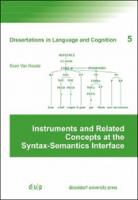Instruments and Related Concepts at the Syntax-Semantics Interface
Abstract
Instruments constitute a classic member of the thematic role inventory, yet they are usually analyzed only peripherally, taking a back seat to the more studied members such as Agent and Patient. This dissertation investigates the semantic reality behind the label instrument from the functionalist perspective of Role & Reference Grammar. Starting from a theoretical investigation of what instrumentality truly means when contrasted with related concepts like comitatives, this book explores the morphosyntactic realization of instruments across a wide range of typologically diverse languages. Apart from the standard occurrences of instruments that come to mind from languages such as Latin, German or English, this book delves into several less common constructions that feature the instrument relation. Such constructions include, amongst others, passives with instruments and particularly the Instrument-Subject Alternation, a construction where the instrument seemingly appears as the subject of the sentence. This construction displays variation along three dimensions: 1) The instrument can vary from a very simple tool to a complicated machine, 2) the predicate can vary substantially and 3) languages differ widely with respect to the construction’s acceptability. This makes for a complex playing field where the animacy of the instrument but also the aktionsart class of the predicate play a major role. The last section of this book deals with linking the semantics of instruments and related concepts to their morphosyntactic realizations, including the various encoding strategies that are available in any given language. This book also features a concise introduction to Role & Reference Grammar. Dissertations in Language and Cognition: This series explores issues of mental representation, linguistic structure and representation, and their interplay. The research presented in this series is grounded in the idea explored in the Collaborative Research Center ‘The structure of representations in language, cognition and science’ (SFB 991) that there is a universal format for the representation of linguistic and cognitive concepts.
Keywords
structure of representations in language; cognition and science; Role & Reference Grammar; Mapping to Morphosyntax; Instruments; Implements; Forces; Instrument-Subject Alternation; Lexical Decomposition; Force DynamicsDOI
10.1515/9783110720365ISBN
9783110720365, 9783957580597, 9783110720365Publisher
De GruyterPublisher website
https://www.degruyter.com/Publication date and place
Berlin/Boston, 2018Imprint
düsseldorf university pressSeries
Dissertations in Language and Cognition,Classification
Linguistics


 Download
Download Web Shop
Web Shop